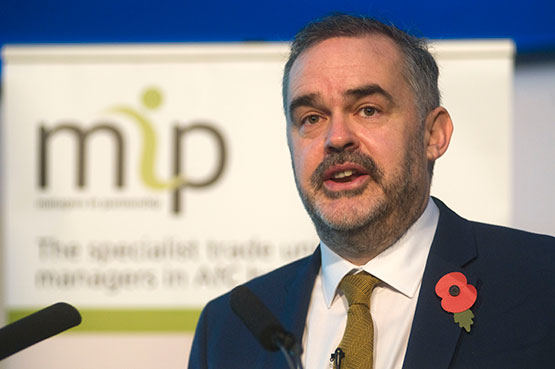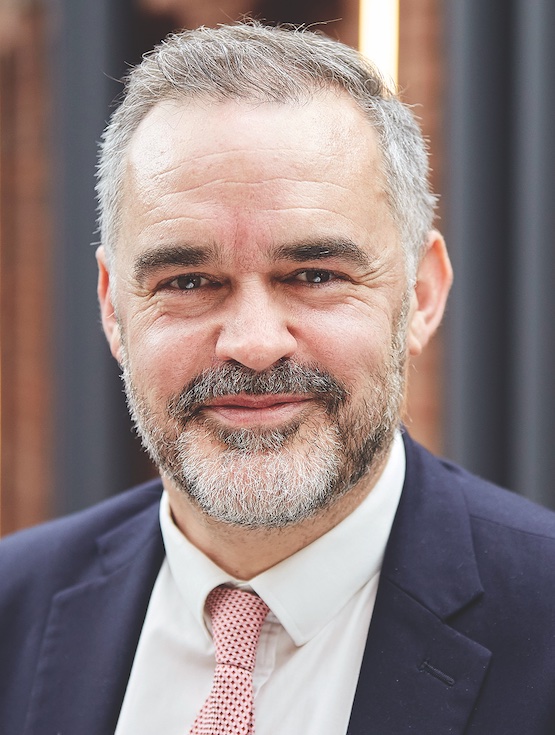Summit 2018 – Staff bear the brunt of deliberate Treasury underfunding

“Deliberate underfunding” of health and care services by the Treasury is creating “great hardship for the people of this country and putting huge pressure on staff,” MiP chief executive Jon Restell told MiP’s Member’s Summit on 6 November.
In his opening speech to delegates, Restell promised that MiP “will not stop banging the drum on funding for both NHS and social care” and warned that it was a “betrayal of the public” to pretend that services could be improved by “great management and efficiencies alone”.
Referring to Chancellor Phillip Hammond’s remarks, made during his budget speech on 29 October, that “it’s time for the public sector to stop being pushovers”, Restell said: “How very dare he! Not only are our members not pushovers, but the effort to push over the NHS in recent years has, it seems, come from the government itself.”
He said the Treasury had “wholly misjudged” the growth in demand for services and the extent to which it could be met by efficiencies rather than better funding. “And the Treasury reckoned without the Lansley reforms which – and we will not stop saying this – cost so much money and lost so many good people from public service, making the funding squeeze much, much worse.”
Restell highlighted the finding of a recent MiP members’ survey that managers believe social care and mental health services have the most urgent funding shortfalls.
“Parents and carers are increasingly experiencing a system designed to keep them out rather than give them the support they need,” he said. “This is not what public services should be like in the world’s fifth largest economy.”
The survey also found that MiP members believe personal taxation is the only credible way to fund health and care services in the long term. “They know you can’t have Scandinavian-level services paid for by a US tax base,” Restell said, “but where is the honest debate on this from politicians?”
Although underfunding has “failed to push the NHS over”, the workforce have borne the brunt of the policy through attacks on pay, cuts in infrastructure and support jobs, and damage to careers and personal wellbeing, Restell warned.
“You demonstrated magnificently that, whatever Phillip Hammond might think, you and your colleagues are not pushovers,” he said. “But the magnificent effort of recent years cannot be sustained forever.”
This summer’s three-year pay deals were “just the start”, he explained. “They end the destructive pay policy, but they don’t restore what has been lost. We now need a decade of investment in pay and conditions for NHS staff.
“This investment must be mirrored by an unprecedented investment in the pay of social care staff, the neglect of whom as a workforce is a national disgrace,” he added.
|
MiP Chief Executive Jon Restell responds to Health Secretary’s package of NHS reforms.
15 November 2024
| By Jon Restell
News
|
|||||
|
The new government has an ambitious ten-year plan to transform the NHS by shifting care closer to home and tackling the UK’s poor record on public health and prevention. But with multiple short-term challenges and little money to spend, ministers will need more than goodwill and good intentions if they’re to turn those ambitions into reality.
15 October 2024
| By Sarah Woolnough
Analysis & opinion
|
|||||
|
Agenda for Change, introduced 20 years ago, was supposed to put an end to inconsistency and unfairness in how NHS staff are paid. But staff shortages and tight budgets mean many staff are now graded below the level of the work they’re doing. It’s time to modernise the system, says Rhys McKenzie.
07 October 2024
| By Rhys McKenzie
Feature
|
|||||
|
Steve McManus’s work developing the leaders and managers the NHS needs for the 21st century has caught the eye of national leaders. The Royal Berkshire trust chief executive talks to Matt Ross about transforming services, developing leaders and the right way to regulate the management profession.
24 September 2024
| By Matt Ross
Interview
|
|||||
|
MiP has welcomed moves to speed up pay progression for Band 8 and 9 managers and tackle long-standing problems with the Agenda for Change pay system that deter staff from seeking promotion.
23 September 2024
| By MiP
News
|
|||||
|
Special Report: People in public-facing jobs are being confronted by more violence and abuse at work, and the NHS is at the sharp end. Existing policies are failing – we need a more co-ordinated and energetic approach to tackle the root causes and protect the staff who care for others.
18 September 2024
| By Craig Ryan
Feature
|
|||||
|
MiP has welcomed a 5% pay rise for very senior and executive senior managers in the NHS in England, after the UK government accepted the latest recommendations from the Senior Salaries Review Body (SSRB).
09 September 2024
| By MiP
News
|
|||||
|
MiP has welcomed the 5.5% pay rise for NHS staff on Agenda for Change as “a notable shift” and a “good starting point” for future negotiations.
04 September 2024
| By MiP
News
|
|||||
|
Reflecting on our own assumptions and behaviour is the first step towards inclusive leadership, writes Ramima Khanam. By putting ourselves in other people’s shoes and learning from conversations we can help to create more inclusive and productive workplaces.
18 July 2024
| By Ramima Khanam
Feature
|
|||||
|
Being made redundant or looking for work in later life can be an unsettling experience. Lucy Standing, co-founder of older workers support network Brave Starts, gives her tips on how to explore your options and boost your chances of finding the job you want.
12 July 2024
| By Lucy Standing
Tipster
|
|||||
|
Related News
-

Helen Carr retires, Jamie Briers steps up and Rosie Kirk joins MiP
Helen Carr’s retirement as MiP’s head of operations at the end of September marks the end of a long and distinguished career in the trade union movement and public service, writes Jon Restell.
-

Government unveils barring scheme for executive-level managers
MiP has welcomed the government’s decision to limit its barring scheme to the most senior NHS managers, but says the proposal is “a small piece of the jigsaw”.
-

Confusion and lack of cash delays ICB job cuts
At least a dozen Integrated Care Boards have paused or postponed redundancy programmes because of a lack of funding and continuing confusion over transferring staff to other NHS organisations under government reform plans.









